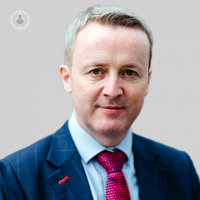Living with chronic fatigue syndrome
Written by:We all get tired from time to time, and we normally know why. We work too much, we’re stressed or we’ve had a string of late nights. Thankfully, a good night’s sleep usually does the trick, and the next morning you’re back to your usual self. But tiredness that lasts a long time and doesn’t go away is not normal and could indicate sometime is wrong. Although prolonged tiredness is a symptom of many conditions, it could be the onset of chronic fatigue syndrome (CFS), also known as myalgic encephalomyelitis (ME). Dr Gerald Coakley, a leading rheumatologist, is here to explain the early signs of this condition, how it affects your quality of life and the support that’s available at his clinic.

What are the early signs of chronic fatigue syndrome (CFS/ME)?
Typically, chronic fatigue syndrome/myalgic encephalomyelitis, often shortened to CFS/ME, begins with a viral infection. The first signs of this are usually a sore throat and fatigue. Glandular fever, also known as infectious mononucleosis, can trigger this condition. While most people who get glandular fever recover fairly quickly without any specific treatment, studies show that as many as 20% of people suffer months of fatigue and flu-like symptoms afterwards. Having other infections such as HIV, viral hepatitis, Lyme disease and Q fever can also cause post-infectious symptoms that persist longer than usual.
Experiencing profound malaise (a general feeling of discomfort or illness whose exact cause is difficult to identify) that lasts a long time, could be a sign that you aren't recovering as quickly as you should be. The patient may find themselves bed-bound for more than one week, or experience extreme disruptions to sleep pattern. This can mean being totally unable to sleep for more than 24 hours, or sleeping more than 18 hours a day.
Can CFS/ME be preceded by other illnesses?
Some conditions seem to predispose people to developing CFS/ME. For example, it is much more common in people who already have irritable bowel syndrome, fibromyalgia or chronic back or pelvic pain.
What else can cause CFS/ME?
CFS/ME is probably not a single condition but a group of symptoms caused by a variety of factors. The hallmark of CFS/ME, as opposed to general fatigue or malaise, is a feature known as post-exertional malaise. This means that if you try to do relatively normal activities, like moderate exercise or socialising after work in the evening, you experience worsening of the fatigue for several days afterwards.
CFS/ME can also occur in people who haven’t had infections. Athletes can develop it as a consequence of over-training.
There are a lot of conditions that have the same symptoms as CFS/ME, which are routinely screened for in suspected CFS/ME cases. These include, autoimmune thyroid disease, Addison’s disease, coeliac disease (gluten hypersensitivity), diabetes, anaemia and chronic kidney disease. Obstructive sleep apnoea and other sleep disorders are also considered when making a diagnosis.
What does living with CFS/ME feel like?
The condition can change your life in many ways. It can be hard to adapt to and affects your overall quality of life. Simple tasks, like showering or getting dressed in the morning, can be difficult to complete, meaning you get tired quicker than usual.

Not knowing you have this condition can be very worrying. The patients we see at The Fatigue Clinic are often quite distressed by the time we see them. Typically neither they, their families nor their doctors have been able to explain or understand their symptoms. If they have been given a diagnosis of CFS/ME, they have usually experienced a lack of sympathy or disbelief from health professionals, friends or relatives. Symptoms are tough to cope with, hard to describe, and there is an unhealthy climate of scepticism surrounding it which is really very difficult for those living with the condition. Many of our patients have been told that “everyone gets tired now and then”, which belittles their illness without providing any tools to cope with it. Some people who have a mild form of the condition manage to carry on at work or school, but only by drastically reducing their social and/or sporting life. Many are in a worse condition by the time we see them and have had to take a substantial amount of time off work. In very rare cases, some are confined their houses or even bed-bound.
What support is available to CFS/ME patients?
Our experience is that people with CFS/ME benefit from a clear, definitive diagnosis. Patients need to have their symptoms recognised and validated, and a plan of management to help them cope with it; balancing work, home life, social life and exercise goals.
At The Fatigue Clinic, we offer an assessment with a consultant physician. For those with CFS/ME, we offer a range of options, from guided self-help to expert cognitive behavioural therapy to help people cope better with the condition. We involve physiotherapists and occupational therapists when needed for graded activities which often help our patients.
In many cases, remaining at work can be a problem, and we advise clients, GPs and occupational health consultants about how to balance work, life and treatment schedules. Sometimes, people don’t recover as quickly as hoped so we often see clients who want advice on ill-health retirement or going part-time in their job.
If you feel you may suffer from chronic fatigue syndrome, visit Dr Gerald Coakley’s profile to book an appointment with him at his clinic.


